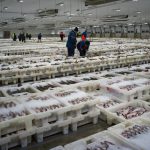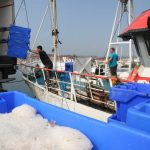The NAFC Marine Centre, in partnership with Shetland Aquaculture and the UHI Millennium Institute’s Centre for Nordic Studies, is offering a new three-year PhD studentship for research into the history of Shetland’s aquaculture industry.
The studentship, which is being jointly funded by Shetland Aquaculture, the Shetland Aquaculture Trust, the Hunter & Morrison Trust and Seafood Shetland, will provide funding for a post-graduate student to study the development of aquaculture in Shetland. The project marks the 25th anniversary of the start of salmon farming in Shetland, with the first locally-produced farmed salmon harvested in 1984.
The main aims of the project are to provide an accurate and comprehensive record of the development of the aquaculture industry in Shetland. The project will also seek to explain how and why aquaculture has developed in the way it has, to identify the factors that influenced its development and to examine the wider effects that these changes have had on the local community.
NAFC Marine Centre’s fisheries development manager, Dr Ian Napier, commented: “It is difficult to remember that a little over 25 years ago there was no aquaculture industry in Shetland. Since then the industry has grown and changed dramatically – despite many challenges – and today it employs hundreds of people and contributes tens of millions of pounds to the local economy.
“One of the main aims of the project will be to record the recollections of the people who were – and still are – involved in the industry.
“Despite the importance of aquaculture to Shetland, very little has been written or recorded about it. This project will help fill an important gap and we are very grateful to Shetland Aquaculture and the other local organisations that have agreed to fund this work.”
General manager of Shetland Aquaculture, David Sandison, added: “First and foremost, this project is about marking history in a very positive and informative way. The study will capture the important events of the last 25 years and will be valuable as a springboard for other purposes, such as permanent exhibitions.
“The academic work is about recording information for posterity and I already have great plans for what we do with the information and how we can use it to best advantage. This project is long overdue and has really been brought to the fore because the industry has reached its 25th anniversary and this is a pertinent way of marking this milestone.”
This project follows on from a similar project that started last year focusing on the post-war development of Shetland’s pelagic fishing industry.
The studentship will cover tuition fees, a stipend, and travel and other project expenses for three years, with the student based at the NAFC Marine Centre.








